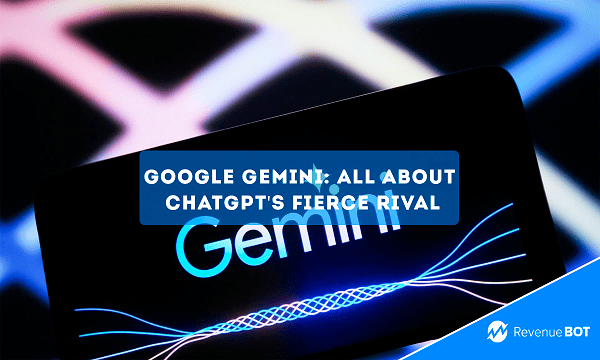
Gemini (formerly ‘Bard’) is a high-powered AI capable of both understanding and responding to your questions and queries (called prompts) as if a real person were doing it.
Overview
Google Gemini represents a family of so-called large language models (LLMs) developed by Google’s AI research lab DeepMind. Such models excel in analyzing data from a broad spectrum of sources, including text, images, audio, video, and code. What sets Google Gemini apart from other existing LLMs, which are mainly focused on text, is its multimodality, meaning it can understand and generate content across various formats mentioned above.
Google’s artificial intelligence chatbot was previously dubbed Bard. However, Sissie Hsiao, the vice president and general manager for Google Assistant, revealed that the chatbot would now be rebranded to Gemini to match the name of the family of multimodal LLMs. This marks a significant stride in Google’s AI offerings, indicating a unified approach to language understanding and generation across different formats.
The Gemini suite
This one is a powerhouse of AI models, ranging from the forward-looking Gemini Ultra aimed at complex tasks such as scientific research, to yet smaller but highly-efficient models such as Gemini Pro and Gemini Nano designed for various needs and environments.
From Bard to Gemini: what’s different?
Despite the rebranding, the core technology and functionalities remain largely unchanged. Up-to-the-minute Gemini Nano mobile app is bringing Gemini’s capabilities directly into users’ hands for their on-the-go needs, providing access to knowledge and pushing creative boundaries.
As for Gemini Advanced (Google’s Ultra 1.0 model), here you are free to unlock the full potential of the most sophisticated LLM variation. Google One users get access to this premium level, which benefits those looking for the best features and performance.
So, how do you access the Advanced version? You must log in with your personal Google account as well as meet the minimum age requirement of 18 years old. What’s more, this ‘Don’t Be Evil’ corporation has started rolling out Gemini across its own products (i.e. Gmail and Search), implying that the AI model effortlessly supports users across a range of activities. In the years to come, more LLM variants in the Gemini family might be introduced, catering to specific needs and tasks.
How does Google’s Gemini work?
Gemini is based on multi-faceted learning, empowering it to create insightful responses as well as to gradually upgrade itself through human interactions.
The model is based on intricate neural networks modeled after the human brain. By processing data across several layers of interconnected nodes, these networks eventually learn to recognize patterns and data relationships. Such networks are trained on a massive text and code data set, enabling it to perform basic reasoning tasks. This means it can draw far more complex conclusions beyond just understanding concepts.
Unlike previous LLMs limited to text processing only, Gemini can analyze data from a number of sources. This enables it to produce more thorough responses, just like how people employ a variety of sources to form their own opinion on a certain matter.
Think of Gemini as a vast library of information gathered from several sources. The sophisticated algorithms used to arrange this very library help Gemini to make connections between concepts, comprehend relationships and even apply logic to provide answers to human queries. As said, Gemini grows its knowledge base non-stop and learns from interactions, which helps it become more intelligent over time.
ChatGPT vs. Gemini: AI showdown
When compared to the world-famous ChatGPT, Gemini boasts a wider range of features as it is able to parse not only text data, but also other types of information. It explores code, images and audio data for more precise and comprehensive response.
Beyond that, Gemini provides a freemium basic service, with advanced features and performance available through the Gemini Advanced subscription for Google One members. Unlike ChatGPT, Gemini supports over 100 languages for processing your text, making it a versatile tool in terms of language abilities.
Google Assistant or Gemini: should you make the switch?
Choosing between Gemini and Google Assistant hinges on your own preferences and needs, as each offers distinct strengths and faces unique challenges.
Gemini sets itself apart with its ability to engage in natural, human-like conversations, making interactions feel more collaborative than talking to a machine. It excels in grasping the context by referencing your past conversations, which allows it to tailor responses more effectively. Gemini may also be leveraged to come up with a wide range of text styles, such as poetry, scripts, code and musical compositions, meeting all of your demands.
Nonetheless, there are some drawbacks as well. The pitfall is that Gemini is still in development, so its functionality — particularly in terms of smart home controls, reminders and routine tasks — it all isn’t entirely par with Google Assistant capabilities. Additionally, there are also privacy concerns since all data is processed on Google servers. Its limited accessibility via the Gemini mobile app as well as its beta status may hinder its popularity.
On the other hand, Google Assistant is available on a diverse set of devices, including smart speakers and Android smartphones, resulting in greater accessibility and user-friendly experience. With its longer history and established reliability, Google Assistant has still proven its worth over time.
Conclusion
By and large, Google Gemini provides a more seamless and human-like interaction, but it has yet to break through some of the limitations and challenges associated with its development.
